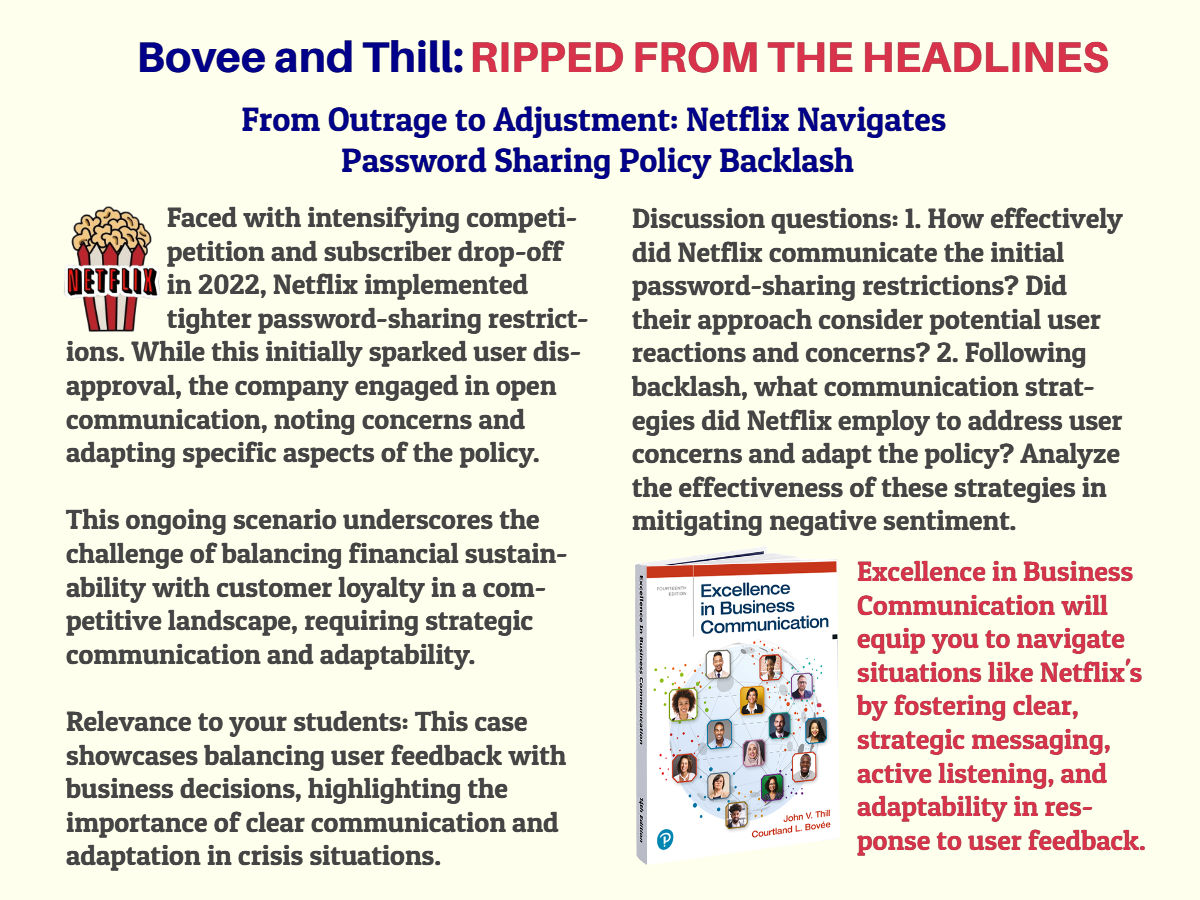
Answers to Discussion Questions:
1. How effectively did Netflix communicate the initial password-sharing restrictions? Did their approach consider potential user reactions and concerns?
Netflix's initial communication regarding password-sharing restrictions likely lacked sufficient consideration for potential user reactions and concerns. The policy faced immediate backlash, suggesting the message may have been unclear, abrupt, or failed to anticipate user sentiment. Analyzing user feedback and conducting thorough pre-implementation communication could have helped mitigate negative reactions.
2. Following backlash, what communication strategies did Netflix employ to address user concerns and adapt the policy? Analyze the effectiveness of these strategies in mitigating negative sentiment.
Following the backlash, Netflix implemented several communication strategies:
Open communication: They acknowledged user concerns and explained the rationale behind the policy.
Policy adjustments: Based on feedback, they adjusted specific aspects of the policy, demonstrating responsiveness.
Continued engagement: They maintained open communication channels to address ongoing concerns.
The effectiveness of these strategies is debatable. While some users appreciated the adjustments and open communication, others remained dissatisfied. This case highlights the ongoing challenge of balancing clear communication with addressing complex business needs while managing diverse stakeholder perspectives.
These questions encourage students to critically analyze the communication aspects of Netflix's situation, prompting them to consider the importance of:
Empathy and audience understanding: Recognizing potential user reactions and tailoring communication accordingly.
Clear and transparent messaging: Providing rationale and avoiding ambiguity.
Active listening and responsiveness: Engaging with feedback and demonstrating adaptability.
Open communication channels: Maintaining ongoing dialogue to address concerns and build trust.
By analyzing these communication aspects, students gain valuable insights applicable to various business scenarios, fostering effective communication skills for navigating complex situations.
 Excellence in Business Communication prepares students to effectively navigate situations like the Netflix password-sharing scenario in several ways:
Excellence in Business Communication prepares students to effectively navigate situations like the Netflix password-sharing scenario in several ways:
-
Crisis Communication Strategies: The book covers strategies for communicating during crises or situations that may negatively impact stakeholders (customers, employees, investors). It teaches students how to craft clear, transparent messaging that acknowledges concerns, explains rationales, and outlines action plans. This is crucial in scenarios like Netflix's policy change where user backlash is expected.
-
Adapting Messages Based on Feedback: The textbook emphasizes the importance of actively listening to audience feedback and adapting communication approaches accordingly. Netflix's willingness to modify aspects of their policy based on user input exemplifies this principle. Students learn how to analyze feedback, identify areas for clarification or adjustment, and pivot their messaging to address specific concerns.
-
Balancing Competing Interests: The Netflix case highlights the challenge of balancing financial sustainability (preventing loss of revenue) with maintaining customer loyalty and satisfaction. Excellence in Business Communication equips students with skills in persuasive communication, negotiation, and finding common ground – enabling them to craft messaging that acknowledges multiple perspectives and proposes mutually beneficial solutions.
-
Stakeholder Communication: The book covers strategies for effective communication with various stakeholders, including customers, employees, investors, and the general public. Students learn how to tailor messaging, choose appropriate channels, and manage communication flows to different audiences during critical situations.
- Crisis Leadership and Decision-Making: Navigating crises often involves tough decisions that may be unpopular but necessary for the organization's long-term viability. The textbook provides guidance on communicating rationales for difficult decisions, building trust and credibility, and exemplifying strong leadership during turbulent times.
By mastering these communication principles and strategies, students gain the skills to navigate complex situations like the Netflix password-sharing policy change with clarity, adaptability, and a balanced approach that considers multiple stakeholder perspectives.